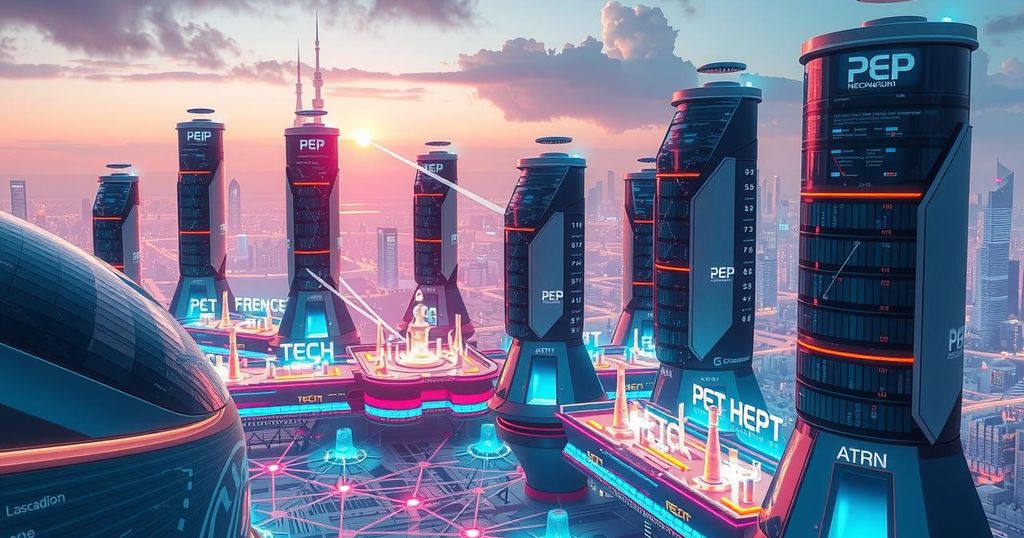Twelve Tech Trends Shaping the Future by 2025
Entering 2025, we anticipate a convergence of groundbreaking technologies like AI, robotics, and quantum computing, significantly impacting our digital landscape. Cybercrime is surging, connecting millions of IoT devices, while advancements in connectivity will facilitate the rise of the metaverse. Innovations in AI personal assistants, drone usages, and semiconductors highlight both opportunities and challenges. This transformative era will necessitate comprehensive regulatory frameworks to navigate the ethical implications of these advancements, ensuring a balanced future.
As 2025 approaches, we enter an age marked by the convergence of groundbreaking technologies like AI, quantum computing, and robotics. These advancements, previously siloed, are now integrating into expansive frameworks, fundamentally altering our digital ecosystem. Stephen Ibaraki of AI For Good forecasts that AI will shift from a leading role to one part of a multifaceted technological ensemble, paving the way for innovations such as humanoid robots and a unified metaverse, as envisioned by experts like Rev Lebaredian and Roberto Romero.
Cybercrime has surged significantly, now accounting for over 25% of criminal activity online. Experts like Nataly Kremer from Check Point Software predict a rise in complex cyberattacks, driven by AI, which will also serve as a tool for cybersecurity advancements. The explosion of IoT devices, expected to reach 32 billion, promises remote access vulnerabilities that cybercriminals can target.
The mobile industry’s future hinges on the evolution of connectivity, moving from 5G to the anticipated 6G networks, which promise a seamless bridge to the metaverse. This new era of communication enables hyper-personalized content delivery and a richer, more immersive internet experience. As Fredrik Jejdling of Ericsson notes, the journey towards this transformation is already underway.
Meanwhile, augmented and virtual reality technologies are fostering a new hybrid reality where digital and physical worlds converge. Innovations like Meta’s latest AR glasses signal a profound shift in user interaction with technology. These devices aim to make advanced digital realities more accessible and integrated into daily living.
AI’s integration will extend beyond devices to become a human-like assistant, capable of processing vast amounts of information intelligently. OpenAI’s CEO Sam Altman describes it as a super-competent colleague who understands the user’s complete digital life, although the anticipated growth of AI assistants saw a slower start this year.
Data traffic is expanding, bolstered by increased mobile usage and the prevalence of connected devices under the IoT umbrella. This explosion of mobile network data, primarily driven by video content, poses challenges for the tech industry, urging a search for sustainable traffic management solutions.
Drones are evolving beyond basic models, venturing into significant roles in surveillance and emergency services. As their application expands, an analyst from ACLU, Jay Stanley, cautions about the potential overreach of this technology, underscoring the necessity for rigorous regulations and oversight.
At the core of these innovations lies the semiconductor industry, which is experiencing a surge in demand driven by AI advancements. Major manufacturers are investing heavily in new facilities to support chip production, while governments worldwide are offering substantial financial support to reduce reliance on foreign producers.
As AI-generated content technologies mature, we see both creative potential and a rise in misuse cases like deepfakes, which pose challenges for societal trust. Experts from MIT and Blackbird AI highlight the importance of counteracting misinformation to preserve democratic integrity and establish truthful narratives in the digital age.
Despite persisting challenges, significant strides are being made in autonomous vehicle technologies and humanoid robotics. Visionary experts warn that while early-stage systems might exhibit flaws, their profound benefits in safety and efficiency make them indispensable to our future.
The convergence of different computing paradigms, including classical and quantum computing, is leading to groundbreaking developments such as digital twins, which allow for real-time simulations of complex systems. Quantum computing promises to complement classical machines and tackle problems that traditional computers cannot solve efficiently.
Finally, advancements in battery technology are crucial for mass electrification efforts, as the industry looks toward alternatives capable of faster charging and greater efficiency. This ongoing journey is set to accelerate as research focuses on solid-state and sodium-ion systems that could redefine power storage and consumption.
The exploration of tech trends in 2025 revolves around a seminal shift marked by the integration of groundbreaking technologies. Innovations in AI, quantum computing, and robotics, which were once isolated developments, are now merging to create unprecedented capabilities. With concerns about cybercrime, evolving connectivity, and the rise of the metaverse, the digital landscape is constantly reshaped, driving discussions about regulation, ethical standards, and societal impacts. The predictions made by experts provide insight into the direction we are headed and the transformative possibilities that lie ahead.
As we look towards 2025, the convergence of technologies promises to redefine our relationship with the digital world. From advancements in cybersecurity and connectivity to the rise of AI-driven assistants and autonomous vehicles, we are on the precipice of significant transformations. While challenges persist, such as managing cybersecurity threats and navigating the ethical landscape of AI and drones, the potential benefits of these converged technologies could lead us to a more cohesive, efficient, and enriched existence. The path we choose now will shape the future we inhabit.
Original Source: english.elpais.com




Post Comment